|
Books Should Be Free Loyal Books Free Public Domain Audiobooks & eBook Downloads |
|
|
Books Should Be Free Loyal Books Free Public Domain Audiobooks & eBook Downloads |
|
Poetry |
|---|
|
Book type:
Sort by:
View by:
|
By: Maurice Baring (1874-1945) | |
|---|---|
 Poems, 1914-1919
Poems, 1914-1919
This is a collection of Maurice Baring's poetry. This collection contains a number of Baring's earlier poetry, written before the war mostly about his travels in Russia. The other part of the collection is made up of poetry concerning World War I, with some particulalry evocative sonnets and other poems. - Summary by Carolin | |
By: Maurice Switzer (1870-1929) | |
|---|---|
 To a Faded Rose
To a Faded Rose
LibriVox readers bring you 16 recordings of "To a Faded Rose" by Maurice Switzer. This was the Weekly Poetry selection for June 16, 2013. | |
By: Maxwell Bodenheim (1892-1954) | |
|---|---|
 Introducing Irony
Introducing Irony
Subtitled 'A Book of Poetic Short Stories and Poems', this collection reads years ahead of its time. Set mainly in Jazz Age New York City, the poems and tales are a series of profiles of people in seedier parts of town, along with bizarre love songs and even a trip to Mars. Not for the easily offended. | |
By: Michael Earls (1875-1937) | |
|---|---|
 Sailor
Sailor
Michael Earls, S.J. was a Jesuit priest, as well as a writer, poet, teacher, and administrator. - Summary by Wikipedia | |
By: Michael Field (1862/1846-1913/1914) | |
|---|---|
 July
July
Michael Field was a pseudonym used for the poetry and verse drama of Katharine Harris Bradley (27 October 1846 – 26 September 1914) and her niece and ward Edith Emma Cooper (12 January 1862 – 13 December 1913). As Field they wrote around 40 works together, and a long journal Works and Days. Their intention was to keep the pen-name secret, but it became public knowledge, not long after they had confided in their friend Robert Browning. | |
 September
September
Michael Field was a pseudonym used for the poetry and verse drama of Katharine Harris Bradley (27 October 1846 – 26 September 1914) and her niece and ward Edith Emma Cooper (12 January 1862 – 13 December 1913). As Field they wrote around 40 works together, and a long journal Works and Days. Their intention was to keep the pen-name secret, but it became public knowledge, not long after they had confided in their friend Robert Browning. | |
 Underneath the Bough: A Book of Verses
Underneath the Bough: A Book of Verses
This is a collection of poems by Michael Field, the pseudonym of Katharine Harris Bradley and Edith Emma Cooper. Those poems are of interest not only because they are beautiful examples of aesthetic poetry, but also because many of them contain homosexuality as a theme. The joint authors lived openly as a lesbian couple for forty years around the turn of the 20th century. - Summary by Carolin | |
 Triumph of Bacchus and Ariadne
Triumph of Bacchus and Ariadne
This Fortnightly Poem is taken from Underneath the Bough, A Book of Verses by Michael Field. - Summary by David Lawrence | |
 Visiting Stars
Visiting Stars
Michael Field was a pseudonym used for the poetry and verse drama of Katharine Harris Bradley and her niece and ward Edith Emma Cooper . As Field they wrote around 40 works together, and a long journal Works and Days. Their intention was to keep the pen-name secret, but it became public knowledge, not long after they had confided in their friend Robert Browning. They wrote a number of passionate love poems to each other, and their name Michael Field was their way of declaring their inseparable oneness... | |
By: Muriel Strode (1875-1964) | |
|---|---|
 My Little Book of Prayer
My Little Book of Prayer
A number of what we might call epigrams concerning one's will, determination, spirituality, and other foci of interest. - Summary by KevinS | |
By: Myrtle Reed (1874-1911) | |
|---|---|
 Sonnets to a Lover
Sonnets to a Lover
This is a book of poetry by Myrtle Reed. Ms. Reed is most famous for her love stories such as A Spinner in the Sun and Old Rose and Silver, and these sonnets are an exploration of the same theme through a different medium. - Summary by Carolin | |
By: Nancy Cunard (1896-1965) | |
|---|---|
 Wheels - The First Cycle
Wheels - The First Cycle
A series of six volumes of Wheels anthologies was produced by members of the Sitwell family, the first in 1916. Apart from Edith, Osbert and Sacheverell Sitwell, the poets represented in the series include Nancy Cunard, whose family founded the Cunard shipping line, Aldous Huxley and Wilferd Owen, as well as a number of more obscure writers. - Summary by Algy Pug | |
By: Nathalia Crane (1913-1998) | |
|---|---|
 Janitor's Boy and Other Poems
Janitor's Boy and Other Poems
Known for her whimsical verse and rhythmic, lilting poems Nathalia Crane was a child prodigy who published her first volume of poetry at the age of 10. There was nothing in her poems that indicated her age. Her delightful verse, and her maturity and insightfulness in poems such as The History of Honey, The Army Laundress, The Reading Boy, The Three Cornered Lot, and The Commonplace, won her recognition among poets. - Summary by AnnaLisa Bodtker | |
By: Nathaniel Parker Willis (1806-1867) | |
|---|---|
 Declaration
Declaration
Nathaniel Parker Willis is also known as N. P. Willis. He was an American author, poet and editor who worked with several notable American writers including Edgar Allan Poe and Henry Wadsworth Longfellow. He became the highest-paid magazine writer of his day. | |
 Belfry Pigeon
Belfry Pigeon
Nathaniel Parker Willis, also known as N. P. Willis, was an American author, poet and editor who worked with several notable American writers including Edgar Allan Poe and Henry Wadsworth Longfellow. He became the highest-paid magazine writer of his day. For a time, he was the employer of former slave and future writer Harriet Jacobs. | |
By: Nixon Waterman (1859-1944) | |
|---|---|
 Sonnets of a Budding Bard
Sonnets of a Budding Bard
This is a volume of 25 sonnets by American poet Nixon Waterman. The sonnets are written from the perspective of a school boy, and are very humorous, supported by some excellent illustrations by John A. Williams. - Summary by Carolin | |
By: Novalis | |
|---|---|
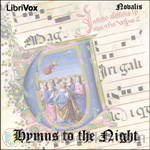 Hymns to the Night
Hymns to the Night
“Hymns to the Night” is the last published work of Georg Philipp Friedrich Freiherr von Hardenberg (1772-1801), the German philosopher and early Romantic poet whose pen name was simply “Novalis”. The work alternates poetry and prose, exploring a personal mythology of darkness and light, but it is also a free-associative chronicle of a young man rationalizing the untimely death of his fiancé. This version (1897) was translated by influential fantasy author and novelist George MacDonald, who cited it as a great – and early – inspiration. | |
By: Oliver Herford (1863-1935) | |
|---|---|
 Kitten's Garden of Verses
Kitten's Garden of Verses
The Kitten's Garden of Verses is a book of short poetry, modeled after Robert Louis Stevenson's A Child's Garden of Verses. Of course, the poems in this book are intended for kittens rather than children! | |
By: Oliver Wendell Holmes | |
|---|---|
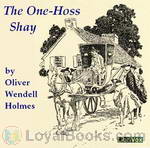 The One-Hoss Shay
The One-Hoss Shay
This is a small collection of whimsical poems by the American physician and author Oliver Wendell Holmes, Sr. "The Deacon's Masterpiece" describes the "logical" outcome of building an object (in this case, a two-wheeled carriage called a shay) that has no weak points. The economic term "one hoss shay," referring to a certain model of depreciation, derives its name from this poem. "How the Old Horse Won the Bet" is a lighthearted look at a horse race. Finally, "The Broomstick Train" is a wonderfully Halloween-y explanation of how an electric tram really works. | |
By: Oliver Wendell Holmes, Sr. (1809-1894) | |
|---|---|
 Chambered Nautilus
Chambered Nautilus
volunteers bring you 13 recordings of The Chambered Nautilus by Oliver Wendell Holmes, Sr. This was the Fortnightly Poetry project for July 3, 2022. ------ The poet discovers an abandoned nautilus shell on the beach, and examining it, muses metaphorically about the beauty and precision of nature, the benefits of struggle, and the motive power of passion which propelled this creature through its life to build this magnificent edifice. It is through the example of the tiny nautilus, growing bigger... | |
By: Omar Khayyám (1048-1131) | |
|---|---|
 The Rubáiyát of Omar Khayyám
The Rubáiyát of Omar Khayyám
The Rubáiyát of Omar Khayyám (Persian: رباعیات عمر خیام) is the title that Edward FitzGerald gave to his translation of a selection of poems, originally written in Persian and of which there are about a thousand, attributed to Omar Khayyám (1048–1131), a Persian poet, mathematician and astronomer. A Persian ruba'i is a two-line stanza with two parts (or hemistechs) per line, hence the word "Rubáiyát" (derived from the Arabic root word for "four"), meaning "quatrains". (Introduction by Wikipedia) The three translations by women comprise this collection of recordings of the Rubaiyat of Omar Khayyam. | |
By: Omar Khayyam (1048-1131) | |
|---|---|
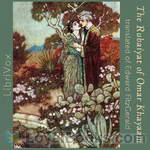 The Rubaiyat of Omar Khayyám (Whinfield Translation)
The Rubaiyat of Omar Khayyám (Whinfield Translation)
Omar Khayyám (1048–1131) was a Persian poet, mathematician and astronomer. In the Western world he is most famous for his many rubáiyát (quatrains), a four line rhyming stanza, which were popularized in an extensively reworked collection in English by Edward Fitzgerald, the first edition of which appeared in 1859. However, Fitzgerald was neither the first nor the most scholarly of the translators of Omar Khayyam’s rubáiyát. As well as translating the poems of Hafez and Rumi, Edward Henry Whinfield (1836-1922) also produced a much more extensive English version of the rubáiyát... | |
By: Omar Khayyám (1048-1131) | |
|---|---|
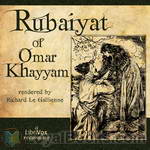 Rubáiyát of Omar Khayyám (Le Gallienne)
Rubáiyát of Omar Khayyám (Le Gallienne)
Richard le Gallienne was an English poet and critic, who, although unfamiliar with the Persian language, had a profound interest in the Rubaiyat of Omar Khayyam. In 1897 he published a collection of 211 quatrains, which was based on earlier English translations, in particular the prose version by Justin Huntly McCarthy. A expanded edition, containing fifty additional quatrains was published in 1901, and this has been used for the present recording. | |
 Rubaiyat Miscellany
Rubaiyat Miscellany
The translation of the Rubaiyat of Omar Khayyam by Edward Fitzgerald has remained the most celebrated rendering in English of the Persian poet's work. While several other scholars produced their own translations of the Rubaiyat, yet others contented themselves by just paraphrasing the work of Fitzgerald. This recording features three reworkings of previously published translations. Arthur Guiterman and Ruel William Whitney based their renderings on the Fifth Edition of Fitzgerald's translation and Richard Le Gallienne, a distinguished poet in his own right, compiled his version from a variety of sources, in particular the prose translation by Justin Huntly McCarthy... | |
 Quatrains of Omar Khayyam of Nishapur
Quatrains of Omar Khayyam of Nishapur
In 1906, Eben Francis Thompson,scholar and poet, published a limited edition of his translation of the Quatrains of Omar Khayyam. This edition contains 878 quatrains, and represents the most extensive translation of Omar's rubai in any language.In the Introduction, Nathan Haskell Dole writes: Mr Thompson has put into English verse this whole body of Persian poetry. It is a marvel of close translation, accurate and satisfactory. He has succeeded in doing exactly what he set out to do - to add nothing and to take nothing away, but to put into the typical quatrain, as determined by Fitzgerald and others, exactly what Omar and his unknown imitators said. | |
 Strophes of Omar Khayyám
Strophes of Omar Khayyám
One of the earliest versions of Omar Khayyám's quatrains by an American translator is John Leslie Garner's collection, published in 1888. It contains 152 quatrains, which the translator calls "Strophes." The collection is divided into eleven books, introduced by quotations from Bourne's "Anacreon," Leconte de Lisle, Giordano Bruno, Goethe, Alfred de Musset, Paul Bourget, Marcus Antoninus, St. James, Sully-Prudhomme, Edmund Waller, and Escriva.In his preface Garner says : "The collection might have been made much larger, but it was deemed inadvisable, as Omar's themes are not many, and the ever-recurring Wine, Rose, and Nightingale are somewhat cloying to Occidental senses... | |
 Rubaiyat of Umar Khaiyam
Rubaiyat of Umar Khaiyam
In 1867 Jean Baptiste Nicolas , scholar and career diplomat, published the first major French translation of the Rubaiyat of Omar Khayyam. This version is in prose and the collection contains 464 verses.In Nicolas’ view, Omar was no Epicurean reveler but rather a relentless spiritual seeker – his frequent allusions to wine and lovers are metaphors, expressive of a divine discontent that can only be resolved by union with a mystical beloved. However, most other translators and commentators regard Omar as a man who sampled and enjoyed both earthly and philosophical delights... | |
 Rubaiyat of Omar Khayyam
Rubaiyat of Omar Khayyam
While the translation of the Rubaiyat of Omar Khayyam by Edward Fitzgerald has become the best known English language version of this classic poem, it is neither the most complete or accurate rendering of Omar's oeuvre. Among others, E.A.Johnson spent nearly thirty years translating all 762 verses of the Lucknow Edition of the Rubaiyat. Apart from this singular publication, the life and activities of the translator remain hidden in obscurity. - Summary by Algy Pug | |
 Quatrains of Omar Kheyyam of Nishapour
Quatrains of Omar Kheyyam of Nishapour
The quatrains of Omar Kheyyam of Nishapour. Now first completely done into English verse from the Persian, in accordance with the original forms, with a biographical and critical introduction by John Payne. London, "Printed for the Villon Society by private subscription and for private circulation only", 1898. - Summary by Algy Pug | |
By: Oscar Wilde (1854-1900) | |
|---|---|
 The Fisherman and His Soul
The Fisherman and His Soul
”The Fisherman and his Soul” is a fairy tale first published in November of 1891 in Wilde’s “A House of Pomegranates”. It tells of a fisherman who nets and falls in love with a mermaid. But to be with her he must shed his soul, which goes off to have adventures of its own. Will forbidden love endure? | |
 Fuite de la Lune
Fuite de la Lune
While at Trinity Collage, Wilde obtained a reputation for clever repartee and keen wit. He affected a superior air in his manners which irritated his fellow undergraduates, so that he once became the object of their practical joking. While at Oxford Wilde made his first essay in public as a writer by contributing several poems to Dublin magazines. - Temple Scott from the Introduction to Poems by Oscar Wilde | |
By: Otto Leland Bohanan (1895-1932) | |
|---|---|
 Dawn’s Awake!
Dawn’s Awake!
volunteers bring you 14 recordings of The Dawn’s Awake! by Otto Leland Bohanan. This was the Weekly Poetry project for February 9, 2020. ------ Otto Leland Bohanan was born around 1895 In Washington, D.C. He graduated from Howard University and taught English at the Catholic University. He also worked as a music instructor at DeWitt Clinton High School and died in 1932. This poem taken from James Weldon Johnson, ed. . The Book of American Negro Poetry. 1922. - Summary by David Lawrence | |
By: Palmer Cox (1840-1924) | |
|---|---|
 Another Brownie Book
Another Brownie Book
Brownies, like fairies and goblins, are imaginary little sprites, who are supposed to delight in harmless pranks and helpful deeds. They work and sport while weary households sleep, and never allow themselves to be seen by mortal eyes. Summary by Palmer Cox | |
By: Paul Laurence Dunbar (1872-1906) | |
|---|---|
 Poet and The Baby
Poet and The Baby
What struck me in reading Mr. Dunbar's poetry was what had already struck his friends in Ohio and Indiana, in Kentucky and Illinois. They had felt, as I felt, that however gifted his race had proven itself in music, in oratory, in several of the other arts, here was the first instance of an American negro who had evinced innate distinction in literature. | |
 Voice Of The Banjo
Voice Of The Banjo
volunteers bring you 18 recordings of The Voice Of The Banjo by Paul Laurence Dunbar. This was the Fortnightly Poetry project for November 3, 2019. ------ What struck me in reading Mr. Dunbar's poetry was what had already struck his friends in Ohio and Indiana, in Kentucky and Illinois. They had felt, as I felt, that however gifted his race had proven itself in music, in oratory, in several of the other arts, here was the first instance of an American negro who had evinced innate distinction in literature... | |
 Candle-Lightin' Time
Candle-Lightin' Time
Poetry about African American Southern life - Summary by Denise Ray | |
By: Percy Bysshe Shelley (1792-1822) | |
|---|---|
 Shelley: Selected Poems and Prose
Shelley: Selected Poems and Prose
The English Romantic Period in literature featured a towering group of excellent poets: Wordsworth, Coleridge, Byron, Shelley and Keats. If we add in forerunners Burns and Blake, we have perhaps an unmatchable collection of writers for any era. Of these, Percy Bysshe Shelley was one of the brightest and best, coupling a giant intellect with a highly emotional and impetuous nature. He was always a champion of liberty, but was largely ignored when he tried to promote political and social reform. He... | |
 The Masque of Anarchy
The Masque of Anarchy
The Masque of Anarchy was Shelley's response to the Peterloo massacre at St Peter's Fields, Manchester, where 18 died and hundreds were injured, after Hussars charged into a rally for parliamentary reform. Written in Italy in 1819, the poem was not published until 1832, ten years after Shelley's death. This reading is from the first published edition with the addition of three words that were inserted in full only in later additions ('Eldon' in Stanza IV and 'Bible' and 'Sidmouth' in Stanza VI). The poem is preceded by Leigh Hunt's preface to the 1932 edition and followed by Harry Buxton Forman's 1887 lecture on the poem to the Shelley Society. | |
 To A Skylark
To A Skylark
LibriVox volunteers bring you eight recordings of "To A Skylark." This is the Fortnightly Poetry for August 8, 2014.To A Skylark was completed by Shelley in late June 1820. It was inspired by an evening walk in the country near Livorno, Italy, with his wife Mary Shelley, and describes the appearance and song of a skylark they come upon. | |
By: Philip Max Raskin (1880-1944) | |
|---|---|
 Love and Longing
Love and Longing
Philip Max Raskin was a Jewish poet about whose life not much can be found today. His poetry, however, lives on, and some poems are still well-known today. This volume contains a series of love-poems, sometimes conveying hope and happiness, sometimes longing and disappointment. - Summary by Carolin | |
By: Phillis Wheatley (1753-1784) | |
|---|---|
 Poems on Various Subjects, Religious and Moral
Poems on Various Subjects, Religious and Moral
Phillis Wheatley was the first African-American to publish a book of poetry in 1773. Born in West Africa, she was sold into slavery at age seven, and bought by a wealthy Massachusetts family who taught her to read and write. Her extraordinary literary gifts led to the publication of her "Poems on Various Subjects, Religious and Moral," and to her eventual emancipation by her owners. Although some of the poems demonstrate an apparent acceptance of the racist values of the white slave-owning classes (which viewed Africans as savage), Wheatley's considerable talents simultaneously contradicted these stereotypes. | |
 To S. M. A Young African Painter, On Seeing His Works
To S. M. A Young African Painter, On Seeing His Works
volunteers bring you 14 recordings of To S. M. A Young African Painter, On Seeing His Works. This was the Weekly Poetry project for April 28, 2019. ------ The Authoress, Phillis Wheatley, was a Negro Servant To Mr. John Wheatley, Of Boston, In New-England. She was the first published African-American female poet, Wheatley was emancipated shortly after the publication of her book. - Summary by wikipedia | |
By: Plato (428-347) | |
|---|---|
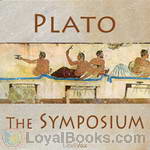 The Symposium
The Symposium
The Symposium (Ancient Greek: Συμπόσιον) is a philosophical book written by Plato sometime after 385 BCE. On one level the book deals with the genealogy, nature and purpose of love, on another level the book deals with the topic of knowledge, specifically how does one know what one knows. The topic of love is taken up in the form of a group of speeches, given by a group of men at a symposium or a wine drinking party at the house of the tragedian Agathon at Athens. Plato constructed the Symposium as a story within a story within a story... | |
By: Publius Ovidius Naso | |
|---|---|
 Metamorphoses
Metamorphoses
The Metamorphoses of Ovid is probably one of the best known, certainly one of the most influential works of the Ancient world. It consists of a narrative poem in fifteen books that describes the creation and history of the world through mythological tales, starting with a cosmogony and finishing with the deification of Julius Caesar. Published around 8 AD, the Metamorphoses are a source, sometimes the only source, for many of the most famous ancient myths, such as the stories of Daedalus and Icarus, Arachne or Narcisus... | |
By: Publius Vergilius Maro (70 BC - 19 AD) | |
|---|---|
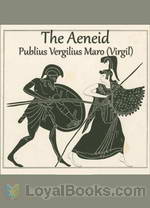 The Aeneid
The Aeneid
The Aeneid is a Latin epic written by Virgil in the 1st century BC that tells the legendary story of Aeneas, a Trojan who traveled to Italy, where he became the ancestor of the Romans. The first six of the poem’s twelve books tell the story of Aeneas’ wanderings from Troy to Italy, and the poem’s second half treats the Trojans’ ultimately victorious war upon the Latins, under whose name Aeneas and his Trojan followers are destined to be subsumed. The poem was commissioned from Vergil by the Emperor Augustus to glorify Rome... | |
 The Eclogues
The Eclogues
This book of poems, written between 42 en 39 BC, was a bestseller in ancient Rome, and still holds a fascination today. Held to be divinely inspired not only by the Romans themselves, but by the Medieval Catholic church, The Eclogues is one of the most beloved collections of Latin short poetry. | |
By: Quintus H. H. Flaccus | |
|---|---|
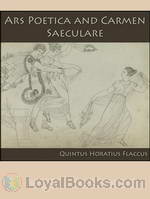 Ars Poetica and Carmen Saeculare
Ars Poetica and Carmen Saeculare
The Ars Poetica, by Horace, also known as Epistula ad Pisones, is a treatise on poetry written in the form of a letter, and published around 18 B.C. In it, Horace defines and exemplifies the nature, scope and correct way of writing poetry. This work, inspired by the book of the same name by Aristotle, is one of the most influential in Latin literature, and the source of famous concepts in poetics, such as “in medias res” and “ut pictura poesis”. The text itself is a poem in 476 dactilic hexameters... | |
By: R. F. Murray (1863-1894) | |
|---|---|
 Wasted Day
Wasted Day
Robert Fuller Murray was a Victorian poet. Although born in the United States, Murray lived most of his life in the United Kingdom, most notably in St Andrews, Scotland. He wrote two books of poetry and was published occasionally in periodicals. | |
By: Rabindranath Tagore (1861-1941) | |
|---|---|
 Gitanjali
Gitanjali
Gitanjali is a collection of 103 poems in English, largely translations by the Bengali poet Rabindranath Tagore. This volume became very famous in the West, and was widely translated into other languages. In England a slender volume was published in 1913, with an exhilarating preface by W. B. Yeats. In the same year, Rabindranath became the first non-European to win the Nobel prize. | |
 First Jasmines
First Jasmines
Rabindranath Tagore, was a Bengali polymath who reshaped Bengali literature and music, as well as Indian art with Contextual Modernism in the late 19th and early 20th centuries. Author of Gitanjali and its "profoundly sensitive, fresh and beautiful verse", he became the first non-European to win the Nobel Prize in Literature in 1913. In translation his poetry was viewed as spiritual and mercurial; however, his "elegant prose and magical poetry" remain largely unknown outside Bengal. Tagore introduced new prose and verse forms and the use of colloquial language into Bengali literature, thereby freeing it from traditional models based on classical Sanskrit... | |
By: Radclyffe Hall (1880-1943) | |
|---|---|
 'Twixt Earth and Stars
'Twixt Earth and Stars
This is a volume of poetry by Radclyffe Hall. The poet and novelist led a highly scandalous lifestyle for the norms of her contemporary society, living openly lesbian in Germany and England. Some of the poems in this volume are also love poems to other women, a fact which was not generally known at the time the book was published. - Summary by Carolin | |
 Sheaf of Verses
Sheaf of Verses
This is a volume of poetry by Radclyffe Hall. At the time of publication of this novel, Radclyffe Hall was living in Bad Homburg in Germany, in a lesbian relationship. Some of the poems in this volume are love poems, and to spare the public's delicate sensibilities, the names of the people to whom the poems were dedicated are removed. - Summary by Carolin | |
By: Rainer Maria Rilke (1875-1926) | |
|---|---|
 Poems
Poems
A concise collection of poems translated from the great German poet Rilke into formal English verse. Although the translation may be freer than some modern texts, this selection, which spans early and later writings and includes a preface refreshingly focused on the poet's artistic development, provides a nice entrée into Rilke's world. | |
By: Rebecca Ruter Springer (1832-1904) | |
|---|---|
 Songs by the Sea
Songs by the Sea
Best known for her mystical writing, IntraMuros, Rebecca Ruter Springer was also a sensitive poet. This a short volume of her poems celebrating the sea. - Summary by Larry Wilson | |
By: Richard Brinsley Sheridan (1751-1816) | |
|---|---|
 Wife
Wife
volunteers bring you 22 recordings of A Wife, by Richard Brinsley Sheridan. This was the Weekly Poetry project for June 13, 2021. ------ Richard Brinsley Butler Sheridan was an Irish playwright and poet. In this little gem, he turns an intended insult on its head. - Summary by TriciaG | |
By: Richard Crashaw (c. 1613-1649) | |
|---|---|
 Hymn of the Nativity, Sung by the Shepherds
Hymn of the Nativity, Sung by the Shepherds
Librivox volunteers bring you seven readings of A Hymn of the Nativity, Sung by the Shepherds by Richard Crashaw. This was the fortnightly poem for December 7 - December 21, 2014. - Ann Boulais | |
By: Richard Dennys (1884-1916) | |
|---|---|
 Better Far to Pass Away
Better Far to Pass Away
At this time of year, we dedicate the Fortnightly Poetry project to the fallen in war. This poem, written at a time when the average life expectancy of an officer at the front was a mere six weeks, vividly demonstrates a young officer's expectation and acceptance of his own death. | |
By: Richard Hovey (1864-1900) | |
|---|---|
 At the Club
At the Club
LibriVox volunteers bring you 14 recordings of At the Club by Richard Hovey. This was the Weekly Poetry project for August 3, 2013.Richard Hovey was an American poet. Graduating from Dartmouth College in 1885, he is known in part for penning the school Alma Mater, Men of Dartmouth. He collaborated with Canadian poet Bliss Carman on three volumes of "tramp" verse: Songs from Vagabondia (1894), More Songs from Vagabondia (1896), and Last Songs from Vagabondia (1900), the last being published after Hovey's death. | |
By: Richard Lovelace (1618-1658) | |
|---|---|
 Lucasta
Lucasta
"Lucasta" is of Latin origin meaning "Pure Light". Besides the dedication of the first poem to his wife, Anne Lovelace, this selection of poems are written from the viewpoint of a soldier who is going off to war - to his lover, who is the love of his life, his Lucasta. While pouring his heart out with memories of her beauty and the joy's that they have shared, he fears she will think badly of him for leaving, and will not wait for him. Therefore, he makes pleas for her loyalty, her love, for her understanding, and for the sacrifice he feels he must make. | |
By: Richard Middleton (1882-1911) | |
|---|---|
 Poems & Songs
Poems & Songs
This is a volume of poetry by English poet Richard Middleton. While hardly known to readers anymore today, Middleton's poems, stories, and essays were all very highly regarded during his lifetime and after his untimely death, having won the admiration of many of his contemporary critics and writers whose fame endured longer than that of Middleton himself. A look into this volume of poetry should convince the reader or listener that Middleton's poetry certainly deserves much more attention than is currently given it. - Summary by Carolin | |
By: Richard Watson Gilder (1844-1909) | |
|---|---|
 Sonnet
Sonnet
Librivox volunteers bring you 10 readings of The Sonnet by Richard Watson Gilder. This was the weekly poetry project for October 5, 2014. | |
By: Ring Lardner (1885-1933) | |
|---|---|
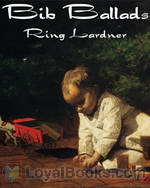 Bib Ballads
Bib Ballads
Ring Lardner is a typical parent when his first child is born, full of wonder and the rest of the usual emotions as he watches his little son grow. He wrote a series of 29 short poems on various facets of parenthood. | |
By: Robert Bridges (1844-1930) | |
|---|---|
 Growth of Love
Growth of Love
Robert Bridges, who was appointed Poet Laureate in 1913, published three versions of his sonnet sequence, The Growth of Love:1876 - 24 sonnets1889 - 79 sonnets1898 - 69 sonnetsThe second edition, which is the subject of this recording, was re-published in 1894, with an extensive introduction from another celebrated poet, Lionel Johnson.The title of the work is a little misleading, as it suggests a process of development, a deepening understanding, by which one arrives at a more comprehensive appreciation of the mysterious entity which we call love... | |
 October and Other Poems
October and Other Poems
This is a collection of poetry by Robert Bridges. This collection also contains some poems written right after World War I, reflecting the state of international politics very impressively. "This miscellaneous volume is composed of three sections. The first twelve poems were written in 1913, and printed privately by Mr. Hornby in 1914. The last of these poems proved to be a “war poem,” and on that follow eighteen pieces which were called forth on occasion during the War, the last being a broadsheet on the surrender of the German ships... | |
 Sonnet 38 from The Growth of Love
Sonnet 38 from The Growth of Love
volunteers bring you 21 recordings of Sonnet 38 from The Growth of Love by Robert Bridges. This was the Weekly Poetry project for August 9, 2020. ------ Robert Bridges was the English Poet Laureate from 1913 until his death. A physician by training, he retired from practice in 1882 and devoted the remainder of his life to literary pursuits. This poem comes from 1898 edition of a sonnet collection entitled the Growth of Love. - Summary by Algy Pug | |
By: Robert Browning (1812-1889) | |
|---|---|
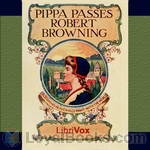 Pippa Passes
Pippa Passes
Pippa Passes was a dramatic piece, as much play as poetry, by Robert Browning published in 1841 as the first volume of his Bells and Pomegranates series. The author described the work as the first of a series of dramatic pieces. His original idea was of a young, innocent girl, moving unblemished through the crime-ridden neighbourhoods of Asolo. The work caused outrage when it was first published, due to the matter-of-fact portrayals of many of the area’s more disreputable characters – notably the adulterous Ottima – and for its frankness on sexual matters... | |
 Easter Interpreted
Easter Interpreted
Robert Browning is still well-known today as a distinguished English poet. His poetry is still widely read, recited, and taught in schools. In this little volume, Rose Porter has compiled a collection of his poems concerning Easter. - Summary by Carolin | |
 Wall
Wall
Browning, when at his best in vigor, clearness, and beauty, is peculiarly a poet for young people. His freedom from sentimentality, his liveliness of conception and narration, his high optimism, and his interest in the things that make for the life of the soul, appeal to the imagination and the feelings of youth. - TEACHERS' COLLEGE, NEW YORK, July, 1899. | |
 Wanting is - What?
Wanting is - What?
Robert Browning was an English poet and playwright whose mastery of the dramatic monologue made him one of the foremost Victorian poets. His poems are known for their irony, characterization, dark humour, social commentary, historical settings, and challenging vocabulary and syntax. When Browning died in 1889, he was regarded as a sage and philosopher-poet who through his writing had made contributions to Victorian social and political discourse. Unusually for a poet, societies for the study of his work were founded while he was still alive. Such Browning Societies remained common in Britain and the United States until the early 20th century. | |
By: Robert Bulwer-Lytton (1831-1891) | |
|---|---|
 Last Wish
Last Wish
volunteers bring you 27 recordings of The Last Wish by Robert Bulwer-Lytton. This was the Weekly Poetry project for January 9, 2022. ----- Robert Edward Bulwer-Lytton was the son of the novelist Edward Bulwer-Lytton, and was an English statesman, Conservative politician, and poet under the pseudonym Owen Meredith. - Summary by TriciaG | |
By: Robert Burns (1759-1796) | |
|---|---|
 Will ye go to the Indies, my Mary?
Will ye go to the Indies, my Mary?
A LibriVox' Weekly Poetry tribute to Robbie Burns on the upcoming Robbie Burns Day. (January 25) Robert Burns (also known as Robbie Burns, Rabbie Burns, Scotland's favourite son, the Ploughman Poet, Robden of Solway Firth, the Bard of Ayrshire and in Scotland as The Bard) was a Scottish poet and lyricist. He is widely regarded as the national poet of Scotland and is celebrated worldwide. He is the best known of the poets who have written in the Scots language, although much of his writing is also in English and a light Scots dialect, accessible to an audience beyond Scotland... | |
By: Robert Burns Wilson (1850-1916) | |
|---|---|
 It Is in Winter That We Dream of Spring
It Is in Winter That We Dream of Spring
volunteers bring you 23 recordings of It Is in Winter That We Dream of Spring by Robert Burns Wilson. This was the Weekly Poetry project for March 10, 2019. ------ Robert Burns Wilson was an American painter and poet. Although his most famous poem was based on the battle cry "Remember the Maine," he was best known during his day as a nature poet. | |
By: Robert Burton (1577-1640) | |
|---|---|
 The Anatomy of Melancholy
The Anatomy of Melancholy
The Anatomy of Melancholy is a book by Robert Burton, first published in 1621. On its surface, the book is a medical textbook in which Burton applies his large and varied learning in the scholastic manner to the subject of melancholia (which includes what is now termed clinical depression). Though presented as a medical text, The Anatomy of Melancholy is as much a sui generis work of literature as it is a scientific or philosophical text, and Burton addresses far more than his stated subject. In... | |
By: Robert Copland (fl. 1515) | |
|---|---|
 Jyl of Breyntfords Testament
Jyl of Breyntfords Testament
Introduction - This is a collection of ten comic pieces from the 16th century and earlier, as compiled and edited by Frederick Furnivall for private circulation in 1871. Only the first is by Copland. (Introduction by Grant Hurlock) | |
By: Robert Frost (1874-1963) | |
|---|---|
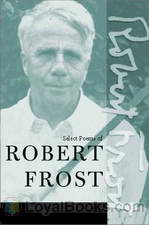 Selected Poems
Selected Poems
“Good fences make good neighbors...” If, as a reader, this is one line you do remember, then the poet Robert Frost would have fulfilled his purpose. The highest goal of a poet, he claimed, was to “lodge a few poems where they would be hard to get rid of...” Unforgettable lines and indelible memories are connected with our encounters with America's best-loved and most popular poet. His wonderful pictures of rural life and the deeply philosophical insights they offer remain with us long after many others have faded... | |
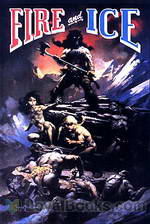 Fire and Ice
Fire and Ice
Written by one of the most significant American poets, Fire and Ice proficiently tackles the continuous query about how the world will cease to exist, whether it will go up in flames, or succumb to the cruelty of ice. First published in Harper’s Magazine in 1920 and later included in his acclaimed anthology New Hampshire, Frost effectively employs the use of simple, yet evocative language that assigns each syllable a significant purpose in the poem, while simultaneously concentrating on a perplexing topic... | |
 A Boy's Will
A Boy's Will
Robert Frost preferred to describe the New England countryside using everyday language. He used both as tools to explore world views and life philosophies. A Boy's Will was his first poetry anthology. | |
 Hillside Thaw
Hillside Thaw
LibriVox volunteers bring you 10 recordings of The Hillside Thaw by Robert Frost. This was the Fortnightly Poetry project for May 5th, 2013. | |
 Stopping by Woods on a Snowy Evening
Stopping by Woods on a Snowy Evening
volunteers bring you 23 recordings of Stopping by Woods on a Snowy Evening by Robert Frost. This was the Fortnightly Poetry project for January 6, 2019. ------ The meanings of this poignant poem--which entered the Public Domain in January 2019 and is being added to the Collection ASAP--range from appreciation of a simple New Hampshire snowstorm scene to reflections on death. Whose house is in the village? What promises need keeping? The poem can be interpreted on many different levels. Quoting... | |
By: Robert Jones Burdette (1844-1914) | |
|---|---|
 When My Ship Comes In
When My Ship Comes In
volunteers bring you 14 recordings of When My Ship Comes In, by Robert Jones Burdette. This was the Weekly Poetry project for June 27th, 2021. ------ Whether you interpret this as sincere, overly simplistic, or cynical is up to you! - Summary by TriciaG | |
By: Robert Louis Stevenson (1850-1894) | |
|---|---|
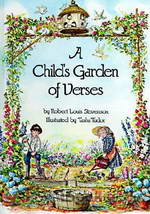 A Child's Garden of Verses
A Child's Garden of Verses
Beloved by many generations of children, A Child’s Garden of Verses is a beautiful collection of children’s poetry. Sometimes thoughtful, sometimes whimsical, but always fun. | |
 Not Yet my Soul
Not Yet my Soul
15 recordings of Not Yet my Soul by Robert Louis Stevenson. This was the Fortnightly Poetry project for May 19, 2013.Robert Louis Balfour Stevenson (13 November 1850 – 3 December 1894) was a Scottish novelist, poet, essayist, and travel writer. His most famous works are Treasure Island, Kidnapped, and Strange Case of Dr Jekyll and Mr Hyde.The following poem comes from his collection entitled Underwoods, first published in 1887. | |
 Where Go the Boats
Where Go the Boats
Where Go the Boats is a short poem by Robert Louis Stevenson. He was a Scottish author famous for writing Treasure Island. He also wrote many poems, including this one, which was published in A Child's Garden of Verses. Some comments from our readers.. "I hope my recording floats your boat." - Assaf "Help prevent toy loss, tie boat to dock after play." - Bruce "I conceive that this simple little verse is about time and writing. Of course, it may just be about little boats." - Jason | |
 My Shadow
My Shadow
Librivox volunteers bring you 14 readings of My Shadow, by Robert Louis Stevenson. Stevenson's famous poem concerns a child's shadow, and it's antics. This was the weekly poetry project for the week of September 7th, 2014. | |
 Child's Garden of Verses (Version 4)
Child's Garden of Verses (Version 4)
Robert Louis Stevenson’s A Child's Garden of Verses is one of the most popular and loved collections of children’s verse of the 19th century. This recital of all 64 poems is designed for children’s listening, especially sections 1–6. - Summary by Michael Maggs | |
By: Robert Maynard Leonard | |
|---|---|
 Poems on Travel
Poems on Travel
This volume of poetry takes the reader, or rather the listener, along on a literary tour through Europe. R.M. Leonard has collected the finest poems by some of the most celebrated poets of the English language, all covering the subject of travel, and often concerning travelling to a certain city or region in Europe. - Summary by Carolin | |
By: Robert Nichols (1893-1944) | |
|---|---|
 Ardours and Endurances
Ardours and Endurances
This is a volume of war poetry by English poet and playwright Robert Nichols. To quote Wikipedia: "On 11 November 1985, Nichols was among 16 Great War poets commemorated on a slate stone unveiled in Westminster Abbey's Poet's Corner. The inscription on the stone was written by a fellow Great War poet, Wilfred Owen. It reads: 'My subject is War, and the pity of War. The Poetry is in the pity.'" This particular volume of poetry contains his most well-known poems, and is also perhaps one of the most haunting collections of war poetry in the English language. - Summary by Carolin | |
By: Robert W. Service (1874-1958) | |
|---|---|
 Ballads of a Bohemian
Ballads of a Bohemian
Ballads of a Bohemian is a collection of poems tied together by the narration of the “author” Stephen Poore. The poems speak of bohemian life in Paris before the war, his experiences during World War I and its aftermath. | |
 Selections from Ballads of a Cheechako
Selections from Ballads of a Cheechako
These twelve poems are from Ballads of a Cheechako which was Robert W. Service’s third book of Yukon poems, published in 1909. The word Cheechako, from Chinook Jargon, originated in the United States (Alaska) and Canada (Yukon) and was imported into local English during the Yukon gold rush that began in 1896. Cheechako, is a non derogatory word meaning “newcomer” or “tenderfoot.” The derivation looks something like this: chee new cha come ko home. | |
 Ottawa Folk Festival Robert Service Collection
Ottawa Folk Festival Robert Service Collection
The Spell of the Yukon by Robert Service with patrons, musicians and organizers. Robert Service is an iconic Canadian poet. | |
 Songs of a Sourdough
Songs of a Sourdough
Reputedly the best-selling poetry collection of the 20th century, 'Songs of a Sourdough' is best known for Robert W. Service's classic Yukon ballads, 'The Shooting of Dan McGrew' and 'The Cremation of Sam McGhee'. Service was born in Preston, Lancashire, and grew up in Scotland. In his twenties, he made his way to Canada and settled in the Yukon where he worked as a bank clerk but evidently dreamed of more adventurous pursuits. Service's readings of his poems show that he could adopt either a Scottish or North American accent. Here they are read in an accent that is not too far removed from the place of his birth. | |
By: Robert Williams Wood (1868-1955) | |
|---|---|
 How to Tell the Birds from the Flowers
How to Tell the Birds from the Flowers
How do you tell apart a parrot from a carrot? A plover from a clover? A bay from a jay? Although there are several ways of differentiating, R. W. Wood’s use of pun and rhyme is one of the most entertaining! | |
By: Roderic Quinn (1867-1949) | |
|---|---|
 Poems
Poems
Roderic Quinn, the seventh child of Irish immigrants, was variously a teacher, public servant and newspaper editor before turning to the writing of poetry and short stories. He was particularly associated with the convivial Dawn and Dusk club which also included as members Victor J. Daley and Henry Lawson. - Summary by SonOfTheExiles | |
By: Roger Casement (1864-1916) | |
|---|---|
 Some Poems of Roger Casement
Some Poems of Roger Casement
This is a small volume of poetry by Roger Casement. Casement was a diplomat for years, active especially in Africa, where he witnessed the dark side of British Imperialism. He began to devote his life to human rights, and is still recognised for his important work particularly in the Congo and in Peru. - Summary by Carolin | |
By: Romesh C Dutt | |
|---|---|
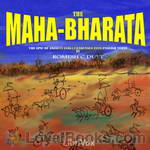 The Mahabharata by Vyasa: the epic of ancient India condensed into English verse
The Mahabharata by Vyasa: the epic of ancient India condensed into English verse
The Mahabharata is one of the two major Sanskrit epics of ancient India. Traditionally, the authorship of the Mahabharata is attributed to Vyasa. With more than 74,000 verses, Mahabharata is said to be the longest poem. Mahabharata tells the story of the epic Kurukshetra War and the fates of the cousin brothers Kauravas and the Pandavas. But more than that the Mahabharata contains much philosophical and devotional material, such as a discussion of the four "goals of life" or 'purusharthas'. The latter are enumerated as dharma (right action), artha (purpose), kama (pleasure), and moksha (liberation). (Introduction by om123) | |
By: Ronald Ross (1857-1932) | |
|---|---|
 Philosophies
Philosophies
This is a volume of poetry by Ronald Ross. It was composed in India during Ross' intensive research of malaria. Ross was first to discover how mosquitoes transmit malaria and was awarded the Nobel Prize in Medicine for this work in 1902. While this research is still well-known today, it is not very well-known that Ross also wrote poetry. This volume contains some of his poems, composed during his stay in India. - Summary by Carolin | |
By: Rosa Mulholland (1841-1921) | |
|---|---|
 Dreams and Realities
Dreams and Realities
This is a volume of poetry by Rosa Muholland. The poetry in this volume is varied, some read like fairy tales, some have a slightly sinister aspect. All poems share the very skillful execution of the verses, and the beauty of the images they evoke. - Summary by Carolin | |
By: Rosanna Eleanor Leprohon (1829-1879) | |
|---|---|
 Afternoon in July
Afternoon in July
LibriVox volunteers bring you 14 recordings of An Afternoon in July by Rosanna Eleanor Leprohon. This was the Fortnightly Poetry project for July 7, 2013.Rosanna Eleanor Leprohon, born Rosanna Eleanor Mullins, was a Canadian writer and poet. She was "one of the first English-Canadian writers to depict French Canada in a way that earned the praise of, and resulted in her novels being read by, both anglophone and francophone Canadians."Leprohon's novels were popular in both English and French Canada in the late 19th-century, and were still being reprinted in French in the mid-1920s... | |
By: Royal Baking Powder Company | |
|---|---|
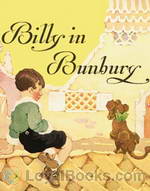 Billy in Bunbury
Billy in Bunbury
This 1924 poem/recipe book, designed as promotional material for the Royal Baking Powder Company, is set in the Oz community of Bunbury. Little Billy, who won’t eat, is taken to the delicious kingdom Bunbury by King Hun Bun to help whet his appetite. Meanwhile, the King leaves the boy’s mother with a recipe book for treats, made easy by the use of Price’s Baking Powder. Written by Ruth Plumly Thompson, though neither her name, nor the illustrator’s (Gertrude Kay) appears on the book. | |
By: Rudyard Kipling (1865-1936) | |
|---|---|
 The Jungle Book
The Jungle Book
Originally written for his young daughter Josephine, who died tragically aged six, The Jungle Book by Rudyard Kipling is a collection of short stories which were published separately in magazines before being compiled into a book. The stories are in the form of fables, where animals communicate and speak to each other as humans do and the purpose of each story was to convey a moral or message to the reader. Modern readers would be more familiar with the Disney animated version in which Mowgli the little “man-cub” is raised by wolves... | |